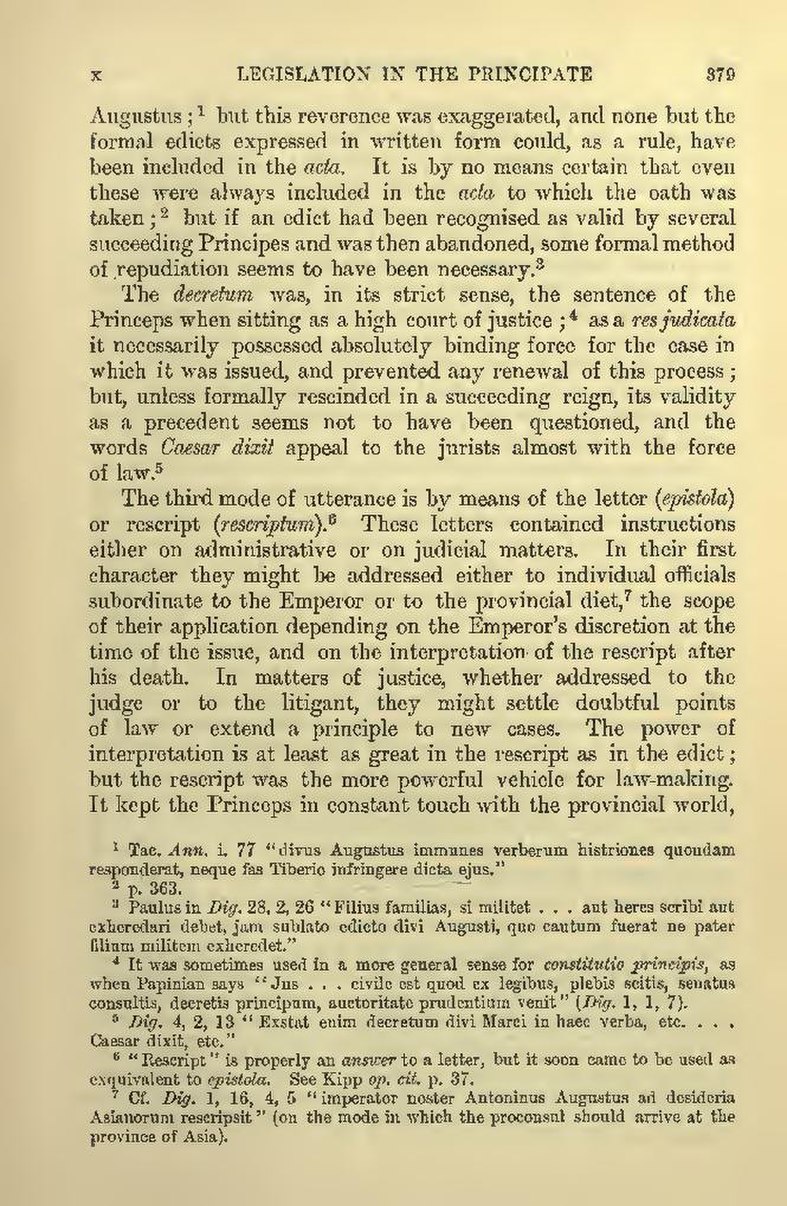Augustus;[1] but this reverence was exaggerated, and none but the formal edicts expressed in written form could, as a rule, have been included in the acta. It is by no means certain that even these were always included in the acta to which the oath was taken;[2] but if an edict had been recognised as valid by several succeeding Principes and was then abandoned, some formal method of repudiation seems to have been necessary.[3]
The decretum was, in its strict sense, the sentence of the Princeps when sitting as a high court of justice;[4] as a res judicata it necessarily possessed absolutely binding force for the case in which it was issued, and prevented any renewal of this process; but, unless formally rescinded in a succeeding reign, its validity as a precedent seems not to have been questioned, and the words Caesar dixit appeal to the jurists almost with the force of law.[5]
The third mode of utterance is by means of the letter (epistola) or rescript (rescriptum).[6] These letters contained instructions either on administrative or on judicial matters. In their first character they might be addressed either to individual officials subordinate to the Emperor or to the provincial diet,[7] the scope of their application depending on the Emperor's discretion at the time of the issue, and on the interpretation of the rescript after his death. In matters of justice, whether addressed to the judge or to the litigant, they might settle doubtful points of law or extend a principle to new cases. The power of interpretation is at least as great in the rescript as in the edict; but the rescript was the more powerful vehicle for law-making. It kept the Princeps in constant touch with the provincial world,
- ↑ Tac. Ann. i. 77 "divus Augustus immunes verberum histriones quondam responderat, neque fas Tiberio infringere dicta ejus."
- ↑ p. 363.
- ↑ Paulus in Dig. 28. 2, 26 "Filius familias, si militet . . . aut heres scribi aut exheredari debet, jam sublato edicto divi Augusti, quo cautum fuerat ne pater filium militem exheredet."
- ↑ It was sometimes used in a more general sense for constitutio principis, as when Papinian says "Jus . . . civile est quod ex legibus, plebis scitis, senatus consultis, decretis principum, auctoritate prudentium venit" (Dig. 1, 1, 7).
- ↑ Dig. 4, 2, 13 "Exstat enim decretum divi Marci in haec verba, etc. . . . Caesar dixit, etc."
- ↑ "Rescript" is properly an answer to a letter, but it soon came to be used as exquivalent to epistola. See Kipp op. cit. p. 37.
- ↑ Cf. Dig. 1, 16, 4, 5 "imperator noster Antoninus Augustus ad desideria Asianorum rescripsit" (on the mode in which the proconsul should arrive at the province of Asia).
